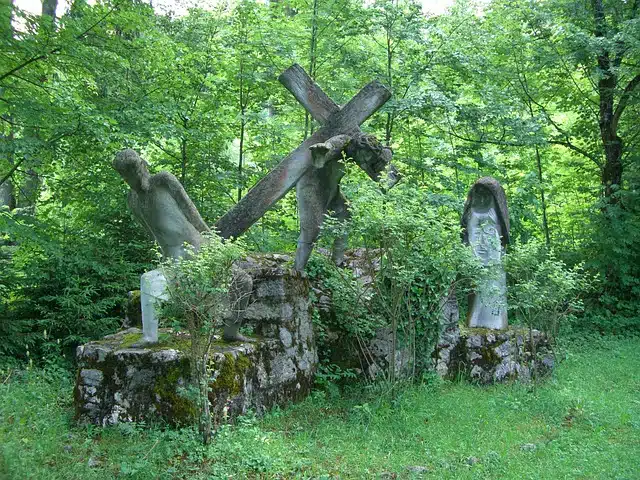
The notion of Calvary refers to Jesus' journey to the mountain where he was crucified.
The first meaning of Calvary mentioned in the dictionary of the Royal Spanish Academy ( RAE ) refers to the route that, marked with altars or crosses , must be crossed while praying at each of its stations to remember Jesus ' march towards the mountain where he was crucified
Calvary comes from the Latin calvarium , although it is believed that its etymological origin is in a Greek expression that can be translated as "place of the skull" . Christian tradition indicates that it was a site located outside the city walls of Jerusalem . The Bible indicates that on that hill Jesus carried his cross and was crucified.
Although this is the name we most commonly give to the site where Jesus was crucified, it is also possible to call it Golgotha , a term that derives from Greek. The allusion to skulls arises from the shape of this hill, which resembled a human skull.
Representation of the Calvary of Jesus
To honor Jesus , there are Christian churches that have places that represent the different stages that the son of God went through on his way to the crucifixion.
For example, in the Argentine city of Tandil , located in the province of Buenos Aires , there is a hill known as El Calvario where stone representations of the Stations of the Cross were installed.

Jesus' path to his crucifixion is remembered in different places.
The concept in colloquial language
In colloquial language, an ordeal is called a succession of problems and conflicts that generate worry, anguish or pain. For example: «This is an ordeal! I lost my job, I don't know how to pay the mortgage and on top of that they just announced that the electricity and water rates will increase" , "My life became an ordeal when my parents died" , "With the help of my family I I got away from the ordeal of drugs .
Suppose a couple decides to take a week's vacation and organizes a trip to the Caribbean . Due to a strong storm, travelers have a flight full of turbulence that generates a lot of fear. When they arrive at the airport, they discover that their suitcases have been stolen . In the following days they can hardly enjoy the beach due to the bad weather . Finally they both return home feeling bad, affected by a tropical illness . All these situations make them define their vacation as an "ordeal."
The ordeal, something difficult to go through
This use of the term ordeal is typical of those people who rely on exaggerated language to describe their experiences and the events that surround them, something very typical of certain cultures but also very rare in others. This group of words also includes torture , misfortune, ordeal and hell, which are often used to refer to situations that are difficult to endure, with such a wide range of possibilities that they cover everything from a bus ride with no empty seats to the consequences. of a natural disaster that has left dozens of dead and injured.
Perhaps this excessive use of certain words is not exclusively due to the way of being of the interlocutor or a certain culture, but also to the fact that the concepts to which they refer do not have a direct representation in current life. If we focus specifically on the term Calvary , surely we do not use it on a daily basis to mention the mountain on which Jesus was crucified nor the path he had to travel until he faced his cruel destiny .
For this reason, in everyday speech we say Calvary thinking about a very difficult situation to go through, precisely because of the suffering that this page of the life of Jesus Christ represented. However, the flexibility that language gives us means that we often choose the least appropriate words to describe our experiences, whether we add to or take away their impact.
